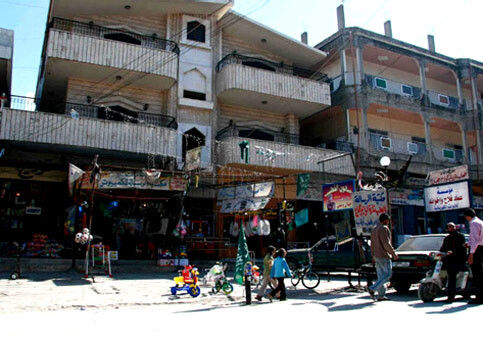Electronic Lebanon 21 May 2007

Nahr al-Bared’s once bustling marketplace is now virtually deserted since the Lebanese army surrounded the camp. (Hugh Macleod/IRIN)
Lebanon - Ma’an - Fierce clashes between the Lebanese army and the Fatah Al-Islam organization have continued in northern Lebanon on Monday, Lebanese security sources have said. The confrontations are focused in the area around the Nahr Al-Bared Palestinian refugee camp, located outside the northern Lebanese city of Tripoli. At least 48 people have died in the two days of fighting, Lebanese sources said, most of them from the Lebanese army.
According to media reports, more than 20 soldiers and 20 fighters from Fatah Al-Islam were killed in Sunday’s clashes, and an unconfirmed number of civilians. The BBC has described the clashes as “Lebanon’s bloodiest internal fighting since the country’s civil war ended 17 years ago.”
The BBC added that sporadic exchanges of fire continued during Sunday night on the perimeters of Nahr Al-Bared camp. On Monday morning the Lebanese army resumed pounding militant positions on the edge of Nahr al-Bared with tank shells and artillery fire.
Deteriorating conditions in the camp
Nahr Al-Bared camp is home to approximately 31,000 Palestinians, out of a total of almost 400,000 Palestinian refugees in Lebanon, according to statistics of the UN agency responsible for Palestine refugees in the Near East, UNRWA. The camp was set up in 1949 to house Palestinian refugees fleeing their homeland following the creation of Israel in 1948. Conditions in the camp are reported to be deteriorating.
According to Al-Jazeera International, the Lebanese army is holding back from entering Nahr Al-Bared camp in accordance with a 1969 Arab agreement banning the Lebanese army from entering any of the country’s 12 refugee centres.
Abu Hisham Laila, an official of the Popular Front for the Liberation of Palestine (PFLP), told Al-Jazeera from inside the camp that the Lebanese bombing of the camp had been “indiscriminate” and said a number of civilians had been killed in the bombing.
“All residents have stayed at home, taking shelter in lower floors,” he was quoted as saying. “We want ambulances to be allowed into the refugee camp to transfer the civilian casualties. We also want fire brigades to enter the camp and put off the fire in many buildings.”
The camp’s electricity, phone lines and water were also cut off, according to Lebanon’s The Daily Star newspaper. “There are bodies on the streets,” Ashraf Abu Khurj, a Palestinian resident of the camp told The Daily Star by phone. Four wounded Palestinians were evacuated from the camp, a Red Crescent spokesman told Agence France Presse, adding that there were more casualties still inside the camp.
Bank robbery
According to the BBC, Sunday’s violence erupted after Lebanese security forces raided a building in Tripoli to arrest suspects in a bank robbery.
Fatah Al-Islam fighters then attacked Lebanese army posts at the entrance to Nahr Al-Bared camp. Witnesses said Fatah Al-Islam militants seized two armoured carriers belonging to the Lebanese army, IRIN, the news agency of the UN’s Office for the Coordination of Humanitarian Affairs reported. Lebanese troops responded by bombarding the camp and storming a building on the outskirts of Tripoli.
“God is testing us and we will serve his cause,” Abu Saleem Taher, a spokesman for Fatah Al-Islam, told IRIN from inside the camp. “We are ready to continue our fight against the Lebanese army and we know that our brothers in the other camps will not stand still if the situation continues.”
Later on Sunday, a bomb exploded in Beirut’s largely Christian eastern district of Achrafieh. One woman was killed in the blast and at least 10 people are reported to have been hurt. It is not clear if there is any connection to the fighting in Tripoli.
Fatah Al-Islam
Fatah Al-Islam split from Fatah Al-Intifada in 2006, which itself split from the Fatah movement in 1983. The Lebanon-based group, which is headed by Shaker Al-Abssi, has been accused of having links to both Al-Qaeda and the Syrian intelligence. Fatah Al-Islam has denied any links to Al-Qa’eda and the charges that it carried out bus bombings that left three people dead in a Christian area north of Beirut in February. Syria has also denied its links to the group.
The Palestinian Fatah movement has also denied links to Fatah Al-Islam. “Fatah al-Islam has no link with the Fatah movement. There is absolutely no connection and they have no right to use the name Fatah,” Fatah spokesman Fahmi Za’arir told Al-Jazeera.
Future fears for Palestinians in Lebanon
“The blows dealt by Fatah Al-Islam against the Lebanese army are a premeditated crime and a dangerous attempt to destabilise (Lebanon),” charged Prime Minister Fuad Siniora, according to AFP.
“The Lebanese army will be shocked by this as they have not normally considered themselves a target for attack,” Timor Goksel, a former United Nations Interim Force in Lebanon (UNIFIL) spokesman and long-time Lebanon security analyst, told IRIN.
“The army plays a very important internal security function and they will now need to restore their credibility. The army might consider putting camps across Lebanon under a similar kind of siege and all Palestinians could suffer. There might be more bloodshed,” he added.
“We are really afraid about what is happening and we don’t want these people in our camp,” Abu Raheja, a Nahr al-Bared shopkeeper, told IRIN. “Fatah Islam is not letting the wounded and civilians leave the camp. They are using us as human bullet vests,” he said.
Related Links

